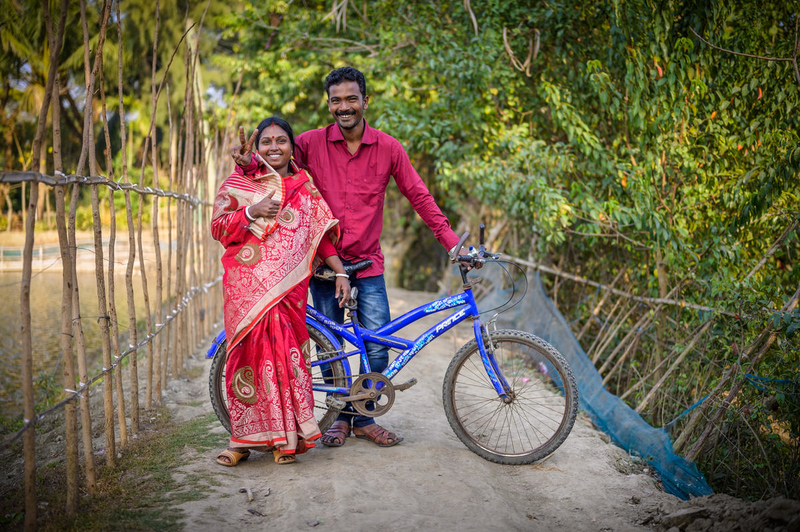Bangladesh has made great progress in poverty reduction, economic growth, and improvements around maternal and neonatal health. However, this growth doesn’t always translate into economic gains across both genders.
Only 4 percent of women in Bangladesh participate in economic activities outside the home, compared to 70 percent of men. National average data from the Bangladesh Demographic Health Survey in 2014 indicated that for 13.1 percent of women, the husband controlled their cash earnings. The median age of marriage was 16.1 among women ages 20-49, with the mean age of first pregnancy at 16.9.

New program supports women by educating men
It’s in this environment that the Nobo Jatra project is helping couples in Bangladesh see each other with fresh eyes. Nobo Jatra, translated as “new beginning,” is a five-year development and food security program implemented by World Vision and funded by USAID. One way the program promotes food security is by working to increase gender-equitable household incomes — and it often starts at Nobo Jatra’s male engagement sessions.
“In this area, there is a huge gap between husband and wife,” says Nasrin Monowara, a facilitator for some of Nobo Jatra male engagement sessions. “Wives do many activities, but there is no recognition from her husband. So at first, we selected the husbands. They worked as a catalyst and worked with other people in the area.”

During the sessions, 12 couples meet with a facilitator every 15 days. The goal is to improve immediate gender relations between the couples, as well as to reduce gender-based violence and child marriage rates.
“Before this class, my husband didn’t acknowledge me,” says Mukti Das. “He didn’t give me any recognition. He would say, ‘You are doing nothing. I am earning outside.’ Sometimes when I asked if he could hold our girl, he would reply, ‘This is not my work.’”
Mukti’s husband, Proshanto, was hesitant to attend the classes at first, but ultimately found them to be life-changing.

“Before, I did not understand,” says Proshanto. “I thought what my wife was doing was valueless. Now I understand that it is time-consuming and essential. She takes care of our livestock, collects water, takes the children to school.”
“Day by day, I saw the behavior of my husband was changing,” says Mukti. “Yesterday, I asked my husband to take our child to school, and he promised he would take care of it.”
The class is also making waves in the community: “Whenever we are helping our wives, people may laugh at us,” says Dinobondhu Das, another husband in the course. “We face criticism by others. But then we describe why we do it.”

And all of the couples agree that teaching their children these lessons — particularly on stopping child marriage and gender-based violence — is vitally important.
“Think about a bicycle,” says another husband, Jayantha Das. “It has two wheels. If one wheel is damaged or leaky, it won’t work anymore. The husband and wife are like the wheels of the bicycle. If someone doesn’t feel happy, the household could be damaged.”
ACT NOW: Support programs like Nobo Jatra that help families lift themselves out of poverty.
Foreign assistance supports programs like Nobo Jatra that empower women, promote health and nutrition, and help communities lift themselves out of poverty. All this for about 1 percent of the total U.S. budget! Your voice helps these programs continue for families in southwest Bangladesh and all over the world!
Top photo: Husband and wife Jayantha and Parbati Das, posing with a bicycle, which Jayantha says is a beautiful metaphor for marriage. (©2019 World Vision/photo by Jon Warren)


